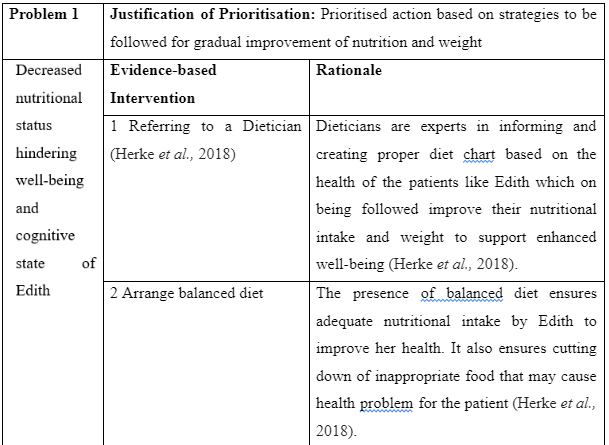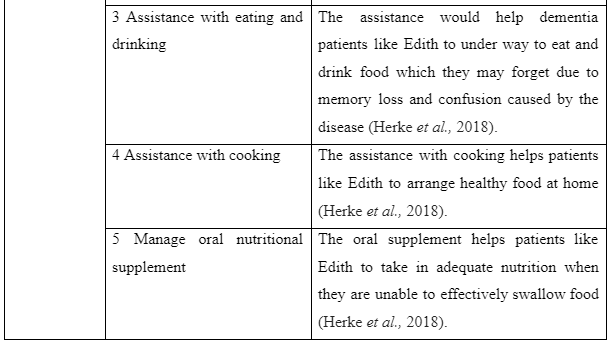Health Assessment for Edith: Integrating ECG, Respiratory
Introduction
The care needs and intervention for Edith is to be discussed and analysed.
Question 1
The ECG (electrocardiogram) is used for measuring the rate of rhythm and electrical activity of the heart (Xu et al., 2018). In Edith’s case, she reported having presence of acute myocardial infraction (AMI) for the past 10 years which though being currently being controlled through rate-controlled atrial fibrillation. In this condition, ECG is important for her health assessment because it would help the nurses determine the performance of her heart and if any relapse regarding heart disease has occurred which is contributing to her sudden weight loss and confusion. The acute myocardial infarction leads individuals to experience shortness of breath out of chest pain and passive pulmonary congestion (Mohan et al., 2018).
Since Edith has AMI, thus her respiratory assessment is to be made to determine if the AMI condition has relapsed or not. The skin assessment is important after fall to determine where the bruises have occurred and their level of healing efficiency (Gyemi et al., 2018). Since Edith has suffered fall and has bruises with skin lesion in the lower leg, thus skin assessment is necessary to determine her healing efficiency. The mini-cognitive assessment is executed to determine level of cognitive impairment in older adults (Li, et al., 2018). Since Edith is showing forgetfulness and confusion regarding cognition, thus the assessment is important to identify her cognitive needs and level of cognitive efficiency or associated disease. For those working on similar healthcare studies or seeking healthcare dissertation help, understanding these assessments is crucial in evaluating patient care comprehensively.

Question 2


Question 3
The definitive diagnosis for Edith’s dementia is important for her to determine the level of dysfunction that has occurred within her brain and the cause of the problem which has led to the presence of the current symptoms (Elahi & Miller, 2017). The definitive diagnosis of dementia for Edith is also important so that the health professionals can determine the cause of the current symptoms and prescribe effective medication along with care support for enhanced health of the patient (Elahi & Miller, 2017). The definitive dementia diagnosis for Edith’s family is needed to make the family understand the cause of the current health deterioration of the disease and the nature of physicians to be approached for arranging early and effective care for the patient (Elahi & Miller, 2017).
Continue your journey with our comprehensive guide to Health Assessment .
Question 4
In Alzheimer’s patient, decreased level of acetylcholnergic transmission occurs in the central nervous system due to which results in lower memory and learning as the neurotransmitter acts in supporting memory and learning development (Atukere et al., 2017). The mechanism of action of Donepezil is to selectively as well as reversibly inhibit acetylcholinesterase enzyme that contributes to the breakdown acetylcholine. It causes the presence of increased acetylcholnergic transmission in Alzheimer’s patients which leads to their better control of memory and learning efficiency (Atukere et al., 2017).
In contrast, the study by Ahmad et al., (2019) mentioned the excitation of glutamatergic transmission through N-methyl-d-aspartate receptor (NMDAR) leads to synaptic plasticity and neuron survival but the excess of NMDAR leads to contribute to neurodegeneration as seen in Alzheimer’s patients. However, the increased NMDAR are controlled through opposition of glutamate-induced excitatory transmission by the action of Donepezil which lower the neuro-degradation in Alzheimer’s patients and helps in maintaining improved cognition (Atukere et al., 2017).
Continue your journey with our comprehensive guide to Health Assessment Report.
Question 5
Edith is experiencing progressive memory loss because Alzheimer’s is slow progressive neurodegenerative disorder occurring within the brain (Shen et al., 2018). It is mentioned that underlying Alzheimer’s disease occurs mainly due to the abnormal and extracellular deposition of amyloid- β which causes formation of soluble Aβ oligomers along with amyloid plaques and hyperphosphorylation if intraneural tau protein which causes neurofibrillary tangles to be formed. The mentioned pathological alteration mainly occurs within the temporal lobe of the brain which is involved in support memory and learning in individuals (Arshavsky, 2014). The neurofibrillary pathology progress in the medial temporal lobe structure which include the entorhinal cortex and hippocampus that have role to play in initial memory formation. In the lobes, initially the pyramidal cells get destroyed but with time and progressing neurodegeneration, the granule cells get destroyed.
Afterwards, the pathological progress to the neocortical associated areas of the brain that are prefrontal, temporal, parietal, and occipital lobes which are responsible for final consolidation and storage of memory of the individuals (Arshavsky, 2014). In the initial stage, the primary and sensory cortex of the brain remain unaffected but in later stages of Alzheimer, the development of non-inflammatory process initiated by the deposition of Aβ oligomers and neurodegeneration causes worsened impact on the cortical areas leading to hindered memory performance and storage (Arshavsky, 2014). Thus, the individuals like Edith at the beginning of Alzheimer’s experience loss of short-term memory with gradual loss of long-term memory making unable to identify known persons and places as the neurodegeneration in the brain occurs gradually.
Question 6





Question 7

According to Austroads guidelines developed in 2012, individuals with diagnosed moderate to severe dementia are not allowed to hold any driving licence. The individuals with mild dementia are required to appear in the driving test to show their capability to drive based on which the licence is to be further ensured (RACGP, 2012). Thus, Edith due to her dementia condition which may be moderate to higher would not be allowed to drive as legal actions could be taken against her. Therefore, the duty of care for Edith is that she is to be provided a driver or support to drive her car and her driver licence is to be evoked.
Conclusion
The study concludes effective holistic care is been arranged for Edith who is suffering from dementia our of Alzheimer’s disease.
Dig deeper into Health and social care management with our selection of articles.
References
Ahmad, J., Hasan, M. J., Anam, A. M., & Barua, D. K. (2019). Donepezil: an unusual therapy for acute diphenhydramine overdose. BMJ Case Reports CP, 12(3), e226836. https://www.ncbi.nlm.nih.gov/pmc/articles/PMC6453413/
An, Q., Wang, K., Sun, F., & Zhang, A. (2020). The effectiveness of modified, group-based CBT for dementia worry among Chinese elders. Journal of Affective Disorders, 274, 76-84. https://deepblue.lib.umich.edu/bitstream/handle/2027.42/
Arshavsky, Y. I. (2014). Alzheimer disease and cellular mechanisms of memory storage. Journal of Neuropathology & Experimental Neurology, 73(3), 192-205. https://academic.oup.com/jnen/article/73/3/192/2917573
Bessey, L. J., & Walaszek, A. (2019). Management of behavioral and psychological symptoms of dementia. Current psychiatry reports, 21(8), 1-11. https://depts.washington.edu/mbwc/content/page-files/Bessey-Walaszek2019_Article_ManagementOfBehavioralAndPsych.pdf
Elahi, F. M., & Miller, B. L. (2017). A clinicopathological approach to the diagnosis of dementia. Nature Reviews Neurology, 13(8), 457-476. https://www.ncbi.nlm.nih.gov/pmc/articles/PMC5771416/
Gyemi, D. L., Clarke, D., van Wyk, P. M., Altenhof, W. J., & Andrews, D. M. (2018). Quantifying forearm soft tissue motion from massless skin markers following forward fall hand impacts. International Journal of Kinesiology and Sports Science, 6(3), 1-11. https://www.journals.aiac.org.au/index.php/IJKSS/article/viewFile/4577/3517
Herke, M., Fink, A., Langer, G., Wustmann, T., Watzke, S., Hanff, A. M., & Burckhardt, M. (2018). Environmental and behavioural modifications for improving food and fluid intake in people with dementia. Cochrane Database of Systematic Reviews, (7). pp.34-56. https://www.cochranelibrary.com/cdsr/doi/10.1002/14651858.CD011542.pub2/full
Li, X., Dai, J., Zhao, S., Liu, W., & Li, H. (2018). Comparison of the value of Mini-Cog and MMSE screening in the rapid identification of Chinese outpatients with mild cognitive impairment. Medicine, 97(22). pp.23-45. https://www.ncbi.nlm.nih.gov/pmc/articles/PMC6392520/
Mohan, B., Bansal, R., Dogra, N., Sharma, S., Chopra, A., Varma, S., ... & Roy, A. (2018). Factors influencing prehospital delay in patients presenting with ST-elevation myocardial infarction and the impact of prehospital electrocardiogram. Indian heart journal, 70, S194-S198. https://www.sciencedirect.com/science/article/pii/S0019483218305571
RACGP 2012, Dementia and driving, Retrieved on 18 October 2021 from: https://www.racgp.org.au/afp/2012/april/dementia-and-driving/
Shen, Y., Ye, B., Chen, P., Wang, Q., Fan, C., Shu, Y., & Xiang, M. (2018). Cognitive decline, dementia, Alzheimer’s disease and presbycusis: examination of the possible molecular mechanism. Frontiers in neuroscience, 12, 394. https://www.frontiersin.org/articles/10.3389/fnins.2018.00394/full
Simonetto, M., Infante, M., Sacco, R. L., Rundek, T., & Della-Morte, D. (2019). A novel anti-inflammatory role of omega-3 PUFAs in prevention and treatment of atherosclerosis and vascular cognitive impairment and dementia. Nutrients, 11(10), 2279. https://www.mdpi.com/2072-6643/11/10/2279
Sriram, V., Jenkinson, C., & Peters, M. (2020). Carers’ experience of using assistive technology for dementia care at home: a qualitative study. BMJ open, 10(3), e034460. https://bmjopen.bmj.com/content/10/3/e034460.abstract
Xu, J., Wang, A., Liu, L., & Chen, Z. (2018). The de winter electrocardiogram pattern is a transient electrocardiographic phenomenon that presents at the early stage of ST‐segment elevation myocardial infarction. Clinical cardiology, 41(9), 1177-1184. https://onlinelibrary.wiley.com/doi/pdf/10.1002/clc.23002
- 24/7 Customer Support
- 100% Customer Satisfaction
- No Privacy Violation
- Quick Services
- Subject Experts



